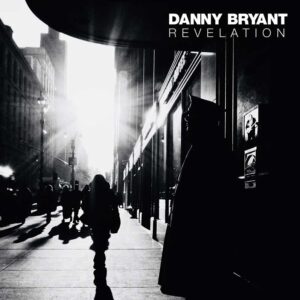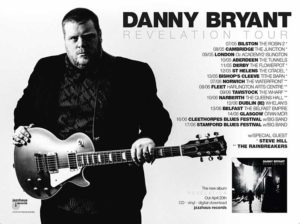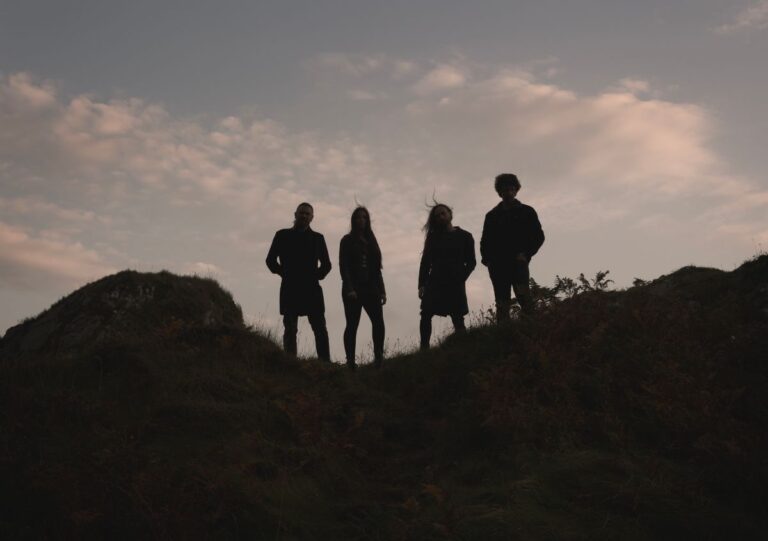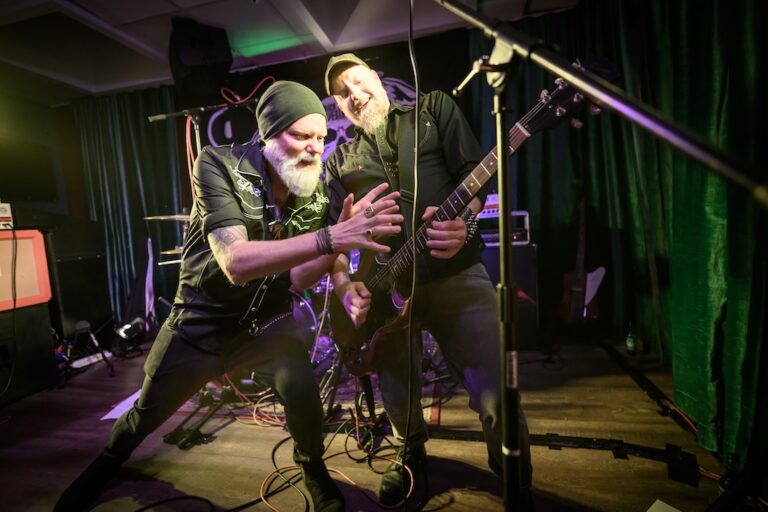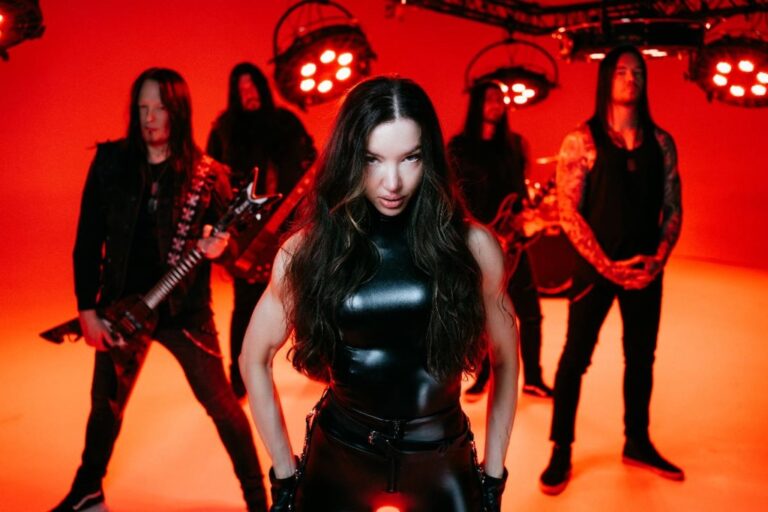On April 20th, Danny Bryant releases ‘Revelation’, arguably the pinnacle of his career to date. An album that tackles, as the best blues does, with incredibly personal issues, it features a number of thematically bleak songs (take ‘isolate’ for example), and yet does so in a manner that is uplifting and cathartic. The nature of the blues, Danny argues, is to “overcome adversity”, not to wallow in it and, as a result, ‘revelation’ is an album that will resonate with many. We had the opportunity to catch Danny via telephone a few weeks back, in order to discuss the writing of his excellent new album, the artwork and his thoughts on the history of producing cover versions within the blues. A thoughtful interviewee, the most notable aspect of the interview was the way Danny would light up as he answered questions about the music he so obviously loves. It was a pleasure to talk to him and you can check the full transcript below.
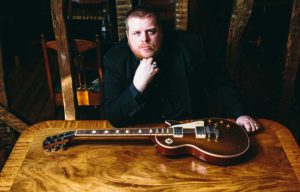
Hi is that Danny?
It is.
Hi this is Phil from SonicAbuse.
Hello mate, how are you doing?
Great – thank you so much for taking the time to talk to me.
Thanks for ringing!
From the start, you’ve talked about this album and you’ve talked about how you dealt with some very heavy vibes, not least the that your father passed away, but it seems to me that the album subscribes to, what I think Eric Clapton once said, about the blues bringing joy from heartache, and that seems to be very much the core theme of this record…
Yeah, very much so. It’s very much, sort of… things that I couldn’t articulate in everyday life and things that were hard to face. So, I put them into the music, which I always have. I always tend to just write about what I know or what I’ve experienced because that way it comes across as honest. It’s very hard for me personally for me to write about something that I don’t know or don’t understand and I don’t feel that I have any business writing about things that I don’t understand or don’t have some sort of experience with, even if, in some way, it’s not direct, it’s indirect. So, yeah, writing songs, especially with the darker subject matter, it is therapeutic, but it’s also… you write about what’s happened to you and what’s going on in your life and what’s around you at a particular time, so if you’re going through a darker period, I guess the songs are going to be darker.
I think there’s a perception from people who don’t listen to the blues so much that “oh it’s depressing isn’t it?” But the music very rarely is that depressing. It can be incredibly soulful, passionate and, in many cases, very uplifting and I guess that’s the dichotomy that sits at the heart of the blues…
I think that’s a very good point and I think particularly in this genre, and to a degree country music, people that don’t really listen to it or understand it, they do believe it to be something that’s just someone… moaning(!) And it isn’t, there’s something quite uplifting about it and, really, blues music to me is about overcoming adversity. That’s really what it stems from. It’s about turning a negative into a positive.
Obviously, the lyrics can be depressing…. And I suppose it’s that split between lyrics that are dark and music that is uplifting. So, when it comes to crafting the lyrics for your work – how do you approach it in a way that you feel comfortable with what you’re putting out there, because with the lyrics you’re putting a lot of yourself on display…
The first rule, really, is that you write whatever you want. You know, as broad a spectrum as you want and then you write and you write… and then you get to the next stage where you present it to the first person who’s going to hear it, which is usually, in my case, a producer. Then you’ll get to the third point where you record it and then the decision comes “do I want to release this? Do I want people to know I’m going through this? Do I want people to know that I feel like this? Or will people read too much into it, or the wrong thing into it?”
But, really, I think if you’re going to be honest to yourself and honest to your music and create something that is art… not to sound over the top about it… but it is art and it has to be honest. It has to have honesty in it and it has to be about human expression, so no, really, to answer the question, I don’t really hold anything back. If I feel it, I write it and maybe I’ll tidy it up a little bit and make it more presentable, but the general theme and idea, I tend to go with it if it’s something that I feel moves me.
Because the things that this album talks about, they’re things that everybody is going to deal with at some point in their lives so, in that sense, unless I’ve missed the mark with it, people should be able to relate to the subject that I’m talking about and the things that the songs are dealing with.
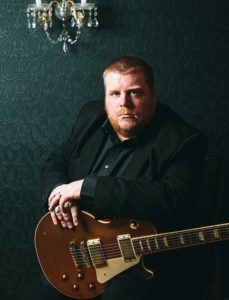
That ability to relate also comes through in the music and one of the things I very much admire about you as a guitarist is the way that feeling and emotion is worked into the way that you play. So, I wanted to ask about the juxtaposition between the technical skills that you obviously need and also the ability to step back and let the passion take over.
Yeah, I think it’s like someone who is a poet… you need to learn certain words, you need to have a vocabulary, but then you need to forget all that and let it be about emotion. So, you learn a certain amount of technique… you have to. You learn certain tricks and things, but when it comes to it, it’s really, for me, playing with feeling. That’s why, when we record, we tend to not do any more than two or three takes on guitar solos and if it’s not really working, we’ll put it to one side and come back to it, maybe later or the next day. You tend to do two or three takes and you learn little bits that you like… “I like that so I must remember to do that at that point, and then I’ll do a bit more improvising and I must remember to hit that note…” and then it becomes something that you’ve learned and you don’t want it to happen too much… you want it to be an emotional, off-the-cuff moment. So that’s the way… I’m not saying it’s the way it should be… but it’s the way I like to do it. I think that’s how the best solos come out. They’re very much cut live and the minute you’re doing that, you’re within the song and you’re within the feeling and you’re not thinking about technique at all.
There seems to be a bit of a shift in music, or at least in certain genres, where bands seem to be moving away from that very clinical, Pro-Tooled approach towards a more live sound and that’s important because you lose so much of the energy when you go down that route.
Yeah, I totally agree, you do. And, it’s the way the whole thing… vinyl has come back and it’s great because it sounds warmer and everything. Now that wouldn’t work for, say a Justin Bieber record. Not that there’s anything wrong with Justin Bieber, but that is very polished, pop music. He uses Pro Tools. But it’s the same kind of analogy… this music is warm and organic, so really, I think, if you cut it live, you keep that warmth, you don’t want to polish off the raw edges too much and it is nice that people are doing that more and more often. But you need a good band and you need a good producer and you need a nice space in which to create. Unfortunately, now a lot of people don’t have the budget and they end up recording at home or something like that, so cutting an album live isn’t always an option.
As you say, it is expensive and it can be a huge leap of faith to go into a studio because as an artist you’re relying on each component. You’re not painting a picture in isolation; you’re relying on each person stepping up to the same mark.
Absolutely, and then again there is nothing wrong with layering things. You can do that and if you’re using studio techniques and trickery because at the end of the day, it’s not a competition, you’re not running a race using performance enhancing drugs… it’s music. As long as it comes out sounding good, that’s all that matters. There are no rules.
It’s definitely nice when you’ve got that slight disparity between an album that allows you to layer elements that you can’t do live due to sheer lack of personnel and a more gritty live performance. If you see a band like Alice in Chains, on record it can be very tight and layered and then live it’s very organic and powerful, but you’ve still got the core song there…
Yeah, I agree, and I mean… recording in the studio and performing live are such vastly different experiences. You record in the studio and… I was saying this the other day… they’re strange environments really because they’re quite sterile places in which to create music and you can pour your heart out, play and at the end it’s like “OK, that’s a take!” or “come in and have a listen,” and then you do that again, whereas live you get that instant gratification – the instant response and, to a certain extent, before you end the song you can judge how people are going to react to it. For that reason, when you take the songs on the road and they’re live, they tend to become longer and more spontaneous and you don’t need to be thinking that it has to be five minutes in case a radio station wants to play it. There’s loads of different factors that go into that and sometimes I think it’s a shame that you can’t take your new songs on the road for a year, play them live, then go into the studio and record them, but the trouble is that nowadays they’d be on YouTube with everything and everyone would be fed up with them before you even go into the studio.
Yeah, it’s a real shame… that was the Pink Floyd technique – to take tracks out on the road and hammer out the kinks before taking it into the studio…
Yeah, and it’s great but you can’t do that now because everyone’s got a sampler and everyone’s got a YouTube account and everybody’s got Facebook, so you can’t really take risks like that anymore. Even on a small scale… and certainly not if you’re Pink Floyd!
On the record you’ve got a couple of cover tunes and, of course, the blues has a long history of interpreting and re-interpreting key works. How do you initially choose a cover version – is there anything that you particularly look for that you can use as a key to make it your own?
Well, the first of all I have to love the song and second of all I have to know that, yeah, I can bring something to it that is me. I don’t want to try to copy it because it’d just be a poor copy of someone else’s really good song. So you have to find a way into the song to see if you can put your own approach to it. So, for that reason, it’s probably best not to cover something really, really famous and obvious… well, just form my angle, it makes it harder. The first one – ‘May I have a talk with you’ – the Howling Wolf song… Hubert Sumlin was always a really big influence on me (the guitar player from Howling wolf), and one of the first blues legends I ever got to meet and spend some time with. As a guitar player he’s really wonderful and quite comical – you know, it could go off the wall and it was a strange kind of style. It sounded like Hendrix way before Hendrix, so I always wanted to do that song anyway. Then someone approached me about doing a Stevie Ray Vaughan tribute album, just having one track on a compilation album with different guitar players doing Stevie Ray Vaughan songs, so I didn’t want to do an obvious Stevie Ray song and I know he recorded a version of ‘May I have a talk with you’… but we didn’t end up doing the song on the tribute album because of contractual reasons, so I started playing it with the band and I really liked it and I saw a chance to get the big band on it. So, that was the reason I chose that song. And then ‘someday the rains will fall’ is a song I’ve loved for a long time and it just seemed to really fit with the album – the kind of ‘you don’t know what’s round the corner’ kind of vibe and it’s quite bleak and I just recorded that as a take one evening and I thought that, if it didn’t come to anything then at least I’d have a version for myself. But it really seemed to fit in to the album and give it another kind of angle. So, that’s how I chose those. That’s usually how it happens, I have to find a way into the song, otherwise I’d rather do my own songs because I don’t want to do a poor version of someone else’s song.
It’s always a sign of a great cover, isn’t it? If you can listen to hear it and hear both the original and the influence of the person who’s covered it, then it’s a success, whereas if you only hear the original, then it’s not worked so well…
You can only cover a song you love, I think.
You mentioned the big band and I love the wider sound you’ve got on the new album – how involved are you in arranging that side of the music? How do you give direction to the rest of the band?
Usually what happens with the big band, because this started as a one-off kind of project when we recorded a live album and it’s kind of taken on its own life…so, we’re running… I’m doing my regular shows and quite a few big band shows this year as well. So, it was important to get them on the album because I really enjoy having that texture. In terms of the horns, I’d tell them what I’d want and then I’d go to David, the trumpet player, who’s really the leader of that four-piece horn section and he’d write it out for me musically because he understands how they work as a group far better than I can. So, I’d give them some initial direction and then he’d come back and he’d write some charts and we’d see if it was what I was looking for, maybe make a few adjustments until we were happy. And obviously Rich, the producer, plays a big part of that as well.
I think there’s something so thrilling when you’ve got the truly big band experience – I know Joe Bonamassa took a horn section out on the road and when you see an artist perform with that kind of additional sound it can be a really exciting experience. It must be amazing to hear that collaboration back in the studio as well…
Yeah, it is and it’s really exciting to do live and I’m glad… logistically it’s a lot different and it’s expensive to do – we’re travelling with a lot of people (9 in the band) and then crew, but it’s worked and it really is a fun thing to do live and we’re playing quite a lot of festivals with that line up this year. It’s something I’ve always wanted to do and, as you say, it’s very exciting and it’s just there when you hear that horn section – it give it that authentic feel.
There’s a track on the album entitled ‘isolate’ which deals (I think) with the disconnect between the human experience and the size and scale of technology that exists today and I was wondering if it was that song in particular that helped to inform the album artwork which has these shots of open cityscapes and people walking in these vast, depersonalised environments and I was wondering if there was a direct connection to that song?
Yeah, it is and I’m glad you picked up on that. Originally there was a choice of calling it ‘revelation’ or ‘isolate’ and I was worried that ‘isolate’ was too bleak a title. But it did inform the artwork, because you’re in this big metropolis but there’s actually not anybody there. And yeah, the song ‘isolate’… you hit a certain age and bad things happen in your life, like losing loved ones and things, and I got very depressed and got bad anxiety, which is something I’ve had on and off all of my life without really finding a solution to it -it’s just something that comes in wave and, with that, you tend to isolate yourself and with it comes a great feeling of isolation and not being able to communicate and not being able to talk to the people that you love. So, in answer to that, yes it does connect with the artwork and it is one of the broader themes of the album.
But in the end, you went with the title ‘revelation’, so presumably the music provides comfort and… emotional healing for those issues?
Absolutely, and certainly creating music helps massively. I live to do it, I love it, and I’m very, very thankful that it’s my career and my job. But also listening to other people’s music helps me a lot. It’s all about relating something and, coming back to that word, not feeling isolated. You can listen to Roy Orbison singing ‘only the lonely’ and think ‘oh god, someone else feels like that!’ So, it’s very powerful and it’s an important tool in my life certainly.
I really only have one last question, which is that you’re heading out on tour with Steve Hill in June. How are you planning to present the new material? Is there a thematic link that’ll bridge the songs together, or are you sprinkling it more widely across the set?
We have… it has to be sprinkled because you always get people who want a cross section of songs, so you don’t want to lay the message of any particular album on too thick. It has to fit in with your other work. The shows have to be fun and it’s a long tour. We start in April, in Germany. We play fifty shows and there aren’t really any off-days. There’s a couple of flying days, you know, travel days, so it’s going to be quite an expensive tour. Then we take a break and then we literally go at it again, so we’re doing a lot of shows. But, I live to be on tour and play and get the satisfaction of playing live and to travel. It should be a lot of fun and I can see a lot of these songs working well live and I haven’t really sat down yet and thought about a complete set list and how we’re going to integrate these songs, but when you have new material, it obviously means cutting old material out. So you have to be careful how you do that, because you’re removing six or seven songs from your current set list and you have to choose which of those it’s going to be and then make the set flow and sometimes that can take a few shows before you’re going to know how they’re bedding in.
Any final words?
Just that I’m looking forward to seeing people at the shows, I hope they enjoy the album and I hope…. My worst fear is someone buying an album or coming to a show and being disappointed, so we always give it 100%… so, I really appreciate everyone’s support.
‘Revelation’ comes out on April 2oth, 2018 via Jazzhaus Recordings.
